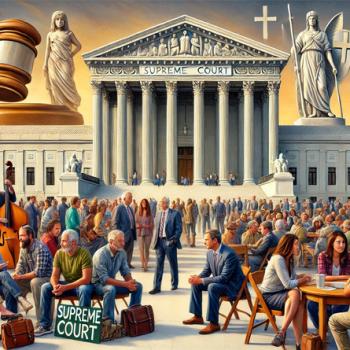Left Behind, pp. 283-288
It's now early Tuesday morning and Buck Williams is headed to the Plaza Hotel for a late night interview with Nicolae Carpathia.
We still don't know why Buck wants to interview the Romanian president. He's determined to ask Nicolae for protection from the international conspiracy — so determined that he hasn't eaten or slept in more than 24 hours. One assumes, though, that this part of the conversation would be separate from the interview he hopes to conduct for Global Weekly. It's also not clear why Nicolae would offer such protection. The only reason Buck suspects he would be able to help is because Buck thinks he's in league with the conspirators. If he is, then why would he agree to protect a journalist working to expose their plot? If he isn't, then what possible help could he offer?
My guess is that while Rayford was on the phone with Hattie, Buck talked with the authors and they assured him that they'd make sure his strange plan worked out.
The first hurdle to this plan is the NYPD, who have been duped into working on behalf of Scotland Yard and Interpol who, in turn, are working on behalf of the international conspiracy. It seems that, since Buck escaped the car bomb intended to kill him, he is now wanted by the corrupt London police. So Buck has to avoid the local police in Manhattan who would, he believes, arrest him on sight and immediately extradite him to England where he would be framed for murder.
All of that might make for the stuff of a diverting thriller, except that the authors haven't bothered to explain the substance of the shadowy conspiracy (better maguffins, please), or why we should consider Buck heroic for backing off of his investigation.
The plan to sneak Buck into the hotel is for Steve Plank to act as a decoy. Steve will go in first with Buck's credentials, so if he gets stopped by the police, they'll take away the wrong man:
Both knew the plan was flimsy, but Buck was willing to try anything …
Anything including begging Carpathia to get Stonagal et. al. to call off the dogs. I can't help but think about the ending to one of my favorite Innocent-Man-Embroiled-in-an-International-Scheme movies, Three Days of the Condor (starring a young Robert Redford with his Carpathian good looks, and John Houseman as Dick Cheney).
[Mild spoiler alert here for those who haven't seen the movie and/or who aren't familiar with the conventions of the IMEIAIS genre.]
Cliff Robertson offers Redford a chance to broker a deal. Redford refuses, saying he's already told the press everything he knows, exposing the conspiracy. The dialogue that follows is archetypal:
ROBERTSON: It didn't have to end this way.
REDFORD: Of course it did.
Yes, of course it did, because that's how these conspiracy stories work. That's what the heroes of these conspiracy stories do. It's what makes them heroes.
Buck is trying to turn this scene around. He's trying to throw himself on the mercy of the conspirators. He wants to say to them that, "It doesn't have to end this way." Unlike Redford, or Cary Grant, or Gene Wilder, or Goldie Hawn, or Bruce Willis, or Will Smith, or Francesca Brown (or even Richard Grieco, for goodness sakes) Buck throws in the towel. He doesn't think of using the power of the press to expose the conspiracy — this despite the fact that he is the press, and if they wanted he and Steve could put their story on every newstand in America. (They might not have a clue yet as to what Stonagal and Todd-Cothran are up to, but Global Weekly could at least go public with what they've uncovered about the lethal coverup.)
So all of the taking-separate-cabs and switching-press-ID tricks that Buck and Steve employ in this little set piece fail to impress. It's hard to be impressed when all those tricks are in the service of our so-called hero trying to negotiate the terms of his surrender with the bad guys.
Anyway, the switcheroo works and Buck gets Chaim Rosenzweig — the Nobel-laureate botanist now serving as Carpathia's personal secretary — on the phone.
"Chaim, I have to move quickly, I'll be using the name Plank, all right?"
"I'll arrange it with Nicolae and get him to my room somehow. You come." He told Buck the number.
That's Rosenzweig's room number, not Carpathia's. We all already know what his room number is.
A competing reporter named Miller overhears this. Like the rest of the national press corps, apparently, Miller has been hanging out in the lobby of the Plaza, hoping for a shot at an interview with Carpathia (because, you know, The Event was last week's news and there's nothing else worth covering). Having already gotten scooped by People and Nightline, Miller doesn't want to get scooped again by Buck, so he tries to race Buck to Rosenzweig's suite to steal the interview.
High jinks ensue. This takes several pages, none of which is good, but since what we're interested in here is the instructively bad aspects of our book, we'll just briefly summarize that Buck shows flashes of violence:
He grabbed Miller's shirt at the neck and pressed him against the wall. …
Then a bit later:
Buck, younger and in better shape, overtook Miller and tackled him in the hallway …
Buck yanked Miller to his feet and put him in a headlock.
What's notable here is that this is how LaHaye & Jenkins seem to think most investigative reporting works. They think it's all about chasing the celebrity interview — being the one guy who gets the Big Interview that everyone else fails to get, even if that means tackling your competitors and putting them into a headlock. I'm pretty sure Seymour Hersh has never done this. (Or, thinking back to another movie starring a young Robert Redford, I don't remember a scene in All the President's Men involving Woodward and Bernstein gang-tackling Jack Anderson outside of Deep Throat's suite at the Plaza.)
The authors' understanding of how actual reporting works seems about as reality-based as their understanding of the geography of Manhattan.
Buck and Miller's wrestling match is finally interrupted by Carpathia himself, ever the peacemaker, surrounded by "four men in dark suits":
"Excuse me gentlemen," Carpathia said. "Pardon me."
"Oh, Mr. Carpathia, sir, I mean President Carpathia," Miller called out.
"Sir?" Carpathia said, turning to face him. The bodyguards glowered. "Oh, hello, Mr. Williams," Carpathia said, noticing Buck. "Or should I say Mr. Oreskovich? Or should I say Mr. Plank?"
The interloper stepped forward. "Eric Miller from Seaboard Monthly."
"I know it well, Mr. Miller," Carpathia said, "but I am late for an appointment. If you will call me tomorrow, I will talk to you by phone. Fair enough?"
Miller agrees and slinks away, aware of his place in the journalist pecking order (Seaboard Monthly ranks below Global Weekly but ahead of State Quarterly and Small Town Annual). Anyway, he's late for drinks with Dirk Burton and Alan Tompkins.
"Come on in, Buck," Carpathia said, motioning him to follow. Buck was silent. "That is what they call you, is it not?"
"Yes, sir," Buck said, certain that not even Rosenzweig knew that.
Buck is understandably a bit shaken by Nicolae's mystic powers of nickname recognition, but probably also a bit reassured. The more powerful Carpathia proves to be, after all, the more likely he'll be able to arrange for favorable terms of surrender with Stonagal's conspiracy.
















